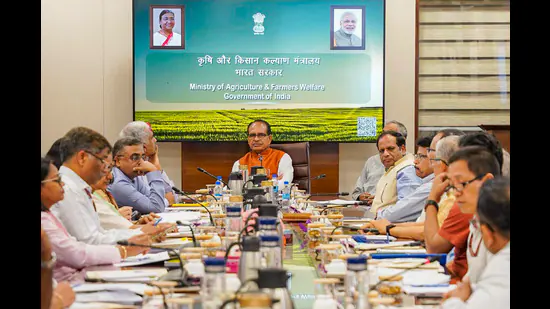Edible oils, pulses in focus as agriculture minister Chouhan takes charge

New Delhi: The agriculture ministry, led by Shivraj Singh Chauhan, aims for self-sufficiency in pulses by 2027-28 and plans a new scheme to enhance edible-oil output. Officials reviewed proposals and ongoing schemes for the kharif season. The strategy includes boosting pulses and oilseeds production with high-yielding seeds. Chauhan, former Madhya Pradesh CM, emphasizes improving farm growth, which had dropped to 1.7% in 2023-24. India, importing 15% of pulses, spent $4 billion on imports last year.
The Shivraj Singh Chauhan-headed agriculture ministry will focus on achieving self-sufficiency in pulses by 2027-28, aside from launching a new scheme to boost edible-oil output, two commodities India still imports to meet domestic demand, officials familiar with the matter have said.
Chauhan, along with ministers of state Ramnath Thakur and Bhagirath Choudhary, held a meeting of key bureaucrats on Wednesday to review proposals for the next 100 days, and studied multiple presentations on the farm economy, an official said.
Officials briefed the minister on the status of ongoing schemes, preparations for the upcoming kharif or summer-sown season, fertilisers and seed availability. Officials also presented plans to boost production of pulses and oilseeds.
Chouhan, a four-term former chief minister of Madhya Pradesh, asked officials to prepare a time bound roadmap to fulfill all guarantees related to the farm sector made by Prime Minister Narendra Modi in his “Sankalp Patra”.
After a patchy monsoon last year, which knocked down farm growth to 1.7% in 2023-24, the lowest since 2018-19, India expects an above-average summer rainy season this year. Good rains are expected to drive farm output from the upcoming kharif or summer-sown season. Ample food stocks are critical to put a lid on prices.
The agricultural sector is critical to Asia’s third-largest economy because nearly half the population depends on a farm income. Good harvests drive up demands for goods and services in the wider economy.
The Union minister is expected to use strategies he had deployed as CM of Madhya Pradesh to turn around the agriculture sector of the state. Average farm growth in the state under his leadership had clocked 7%, higher than the national average of 3.7%.
Chouhan is also credited with making Madhya Pradesh a major wheat producer by expanding irrigation and offering bonuses over minimum support prices.
A key goal of the agriculture ministry under Chouhan’s watch will be to ramp up production of pulses, expanding both the area and yields, so that the country becomes self-sufficient in the next three to four years, a second official said.
“The plan to increase pulses output will depend on the same strategies as we adopted for oilseeds. There will be provisions of high-yielding seeds and focus states,” the second official said.
The government is also likely to announce a national oilseeds mission in the regular Budget in July, which will focus on raising output and productivity of mustard, groundnut and soybean, the first official said.
India imports up to 15% of its pulses demand annually and the country spent nearly $4 billion on imports in 2023-24, making it a volatile group of commodities.
Shortly after the Modi government assumed office during its first term in 2014, it focused on farm and trade policies to raise pulses output to avoid reliance on imports. Long-term import deals with nations, such as Mozambique, were signed to hedge against rise in global commodity prices.
According to the agriculture ministry’s data, a campaign to distribute improved seeds raised pulses productivity by 34.8%, from 727 kg/hectare in 2018-19 to 980 kg/hectare in 2021-22. The policy push to boost output led to a fall in imports.
Source Link : https://www.msn.com/en-in/news/India/edible-oils-pulses-in-focus-as-agriculture-minister-chouhan-takes-charge/ar-BB1o7Va3

















